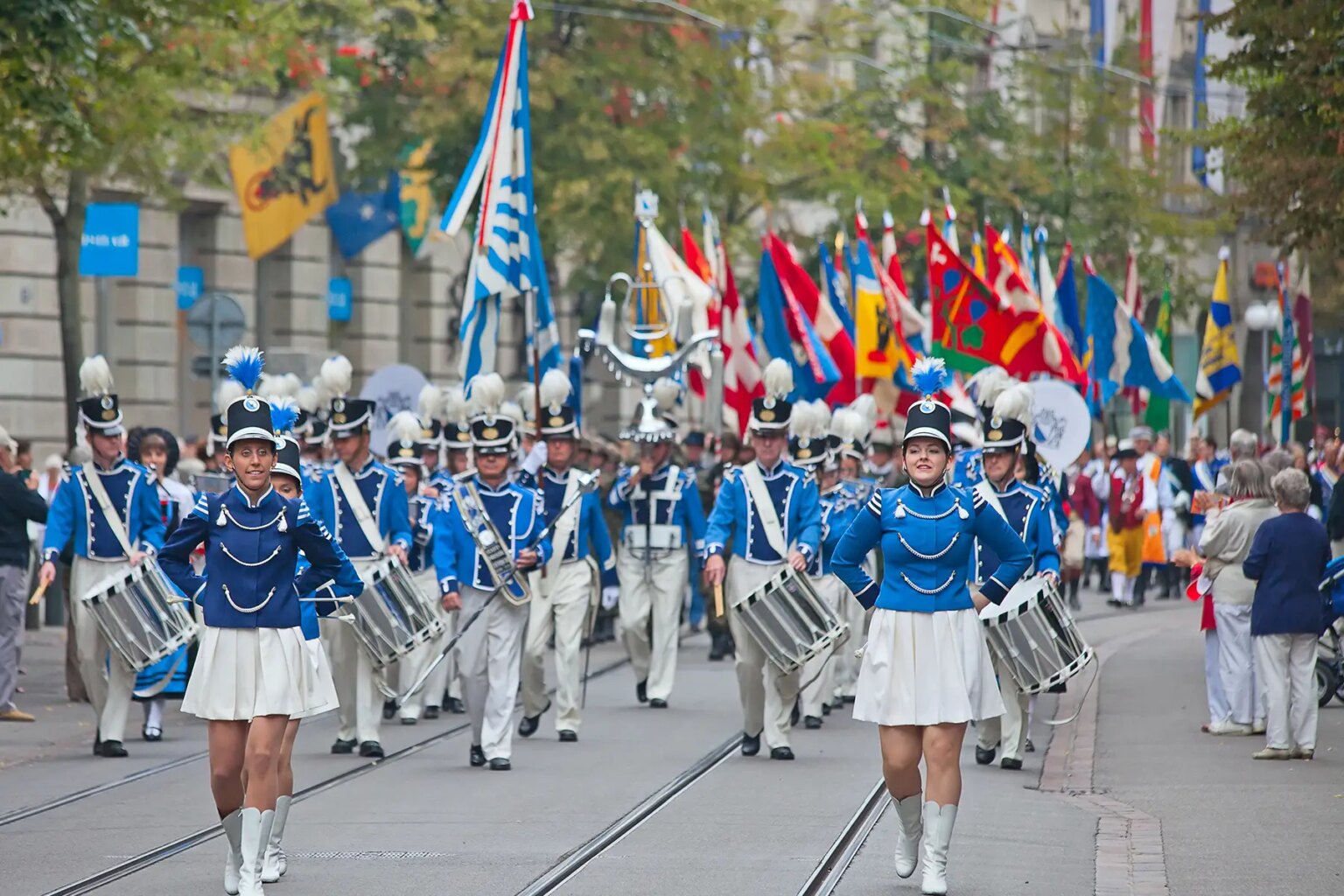Switzerland’s high quality of life, excellent healthcare system, and beautiful natural landscapes make it an extremely appealing destination for expats. However, like anywhere in the world, integrating into the local culture requires some effort on your part. After all, the Swiss have their own social norms, quirky cultural traits, and of course, stereotypes; some of which are best avoided and others wholly embraced. Aside from big tasks such as finding a job, looking for a home, and sorting out your health insurance, familiarizing yourself with Swiss culture should be high on your list of priorities when relocating to the country.
Luckily, this guide is here to help by providing the following information on Swiss people and what to expect when starting your new life in the country:
Sirelo
It's no secret that moving abroad can be stressful. Sirelo's team of removal advisers is here to help. They provide five free quotes from international shipping companies so you can find the best options at the best prices. Take the stress out of your relocation to Switzerland with Sirelo.
The Swiss people in numbers and facts
Here are some top-line statistics in case someone corners you and asks you what percentage of Swiss people speak Romansh. Disclaimer: that probably won’t happen.
Geography
Let’s start with the basics: Switzerland is located in Central Europe and lies east of France, north of Italy, west of Austria, and south of Germany. The country consists of three main geographical regions which are the Alps, which cover 58% of the country, the Central Plateau (31%), and the Jura (11%). Interestingly, although the Alps cover the majority of the country, only 11% of the population live there. Given Switzerland’s unique geographical location, it is perhaps unsurprising that it is home to some of the most beautiful natural scenery in the world.

Population
According to World Bank data, the population of Switzerland in 2021 was estimated at 8,703,405. This is equivalent to 0.11% of the total world population. In terms of countries by population, this places Switzerland at 101 globally. Interestingly, the majority of the population (74.1%) live in urban areas, and the median age in the country is 43.1 years.
Cantons and cities
Switzerland is divided into 26 Swiss cantons, all of which manage their own education, healthcare, law enforcement, taxes, and social welfare systems. These cantons vary significantly in size and population. For instance, the largest canton is Graubünden, which covers 7,105 square kilometers, and the smallest is Basel City, which is a modest 37 square kilometers in size.
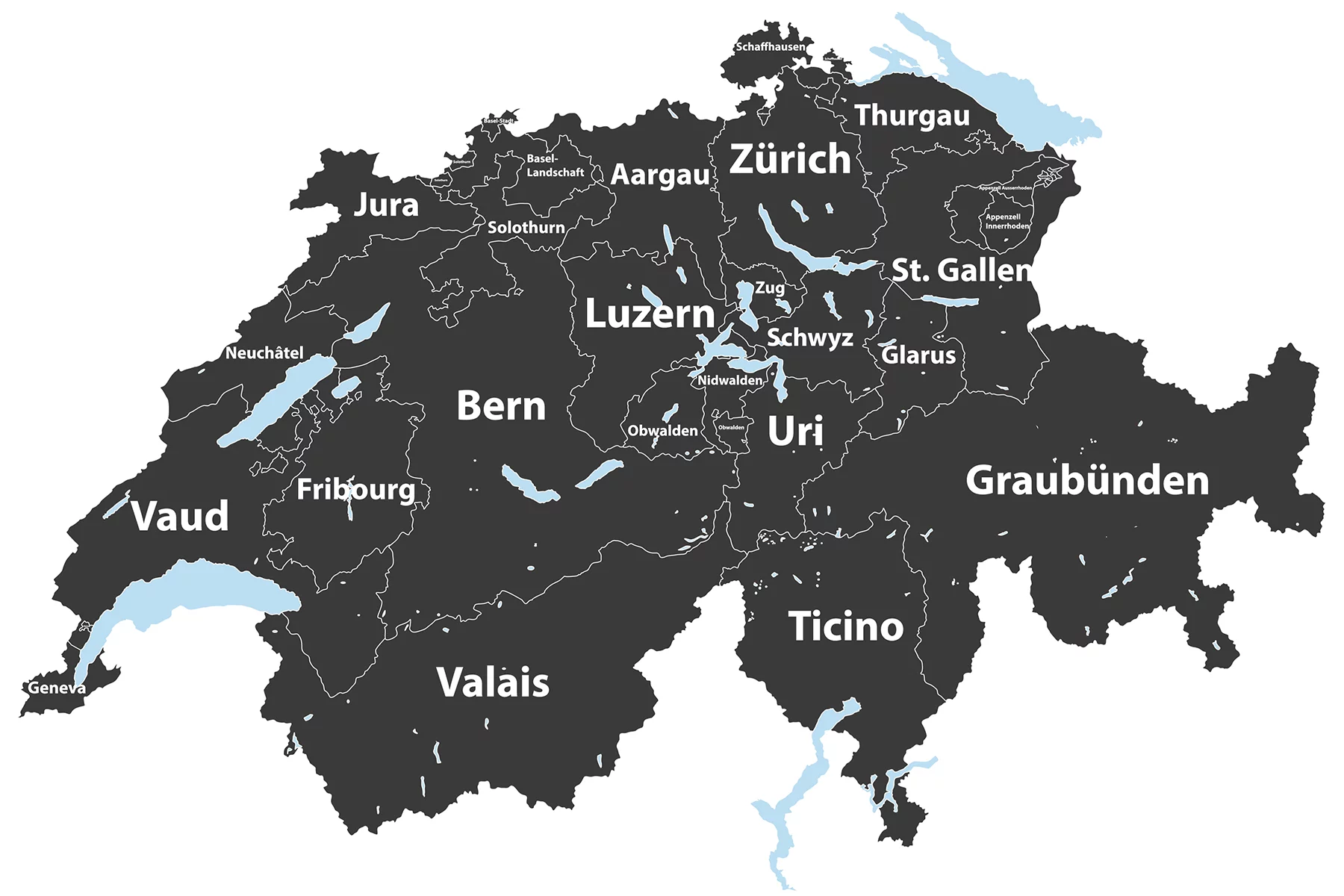
In terms of population, Switzerland’s five biggest cities are Zurich (with 427,487 people), Geneva (203,757), Basel (173,422), Lausanne (141,355), and Bern (134,441).
Languages
According to the Federal Statistics Office, there are four official languages in Switzerland, which are German (spoken by 62% of the population in 2019), French (23%), Italian (8%), and Romansh (0.5%). However, several other non-national languages are also spoken throughout the country, including English and Portuguese. You can read more about languages in Switzerland in our guide.
Religion
Switzerland is a predominantly Christian country. The main religions in the country are Roman Catholic (36.5%), the Reformed Evangelical community (24.4%), other Christian denominations (6%), Muslim (5.2%), and Jewish (0.3%). That said, 25% of the Swiss population has no religious affiliation. You can read more about religion in Switzerland in our guide.
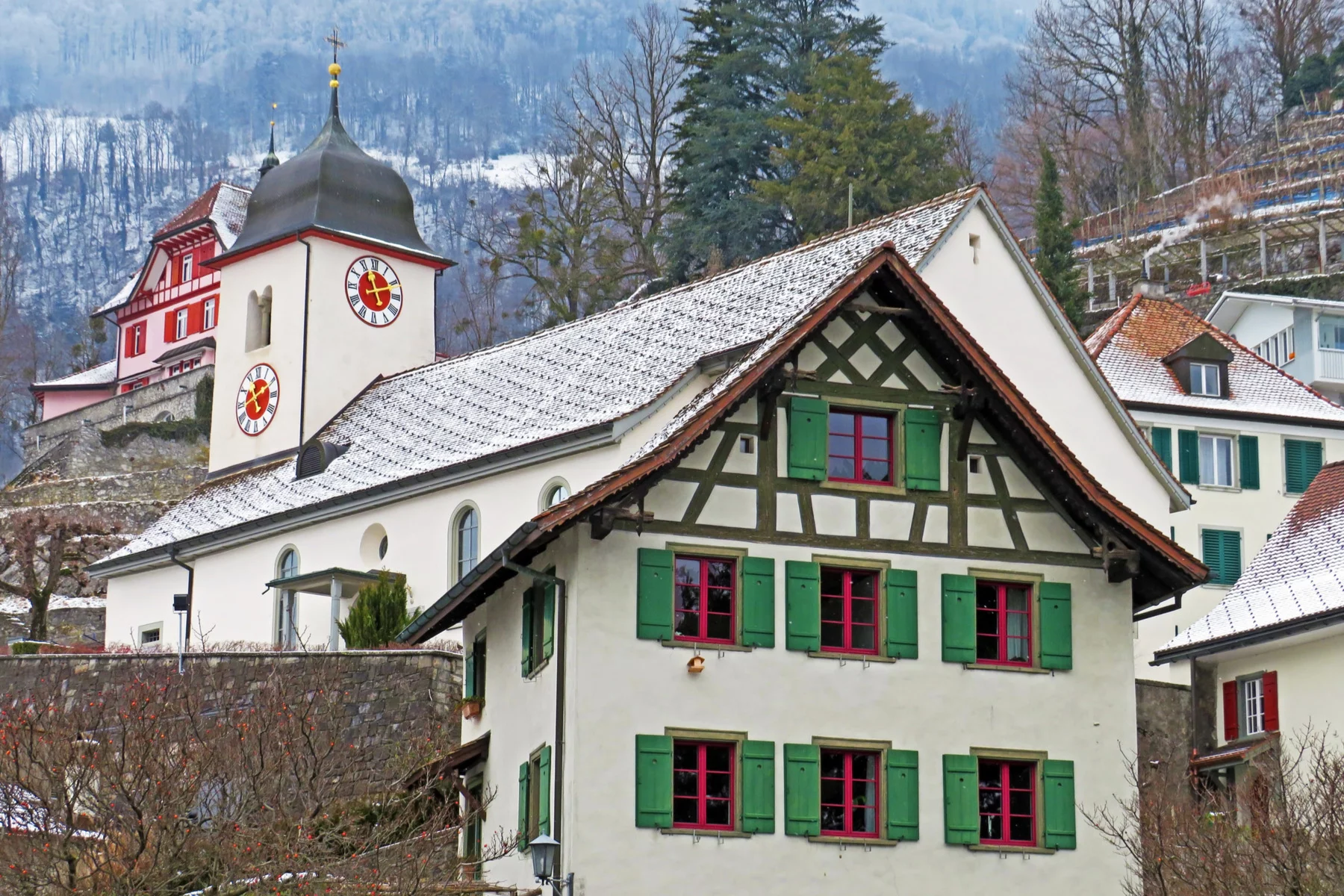
Healthcare
According to the World Health Organization, Switzerland ranks 20 in the world for its healthcare. The country also has one of the most expensive healthcare systems in the world, which currently amounts to around 12% of the gross domestic product (GDP). This is placing increasing financial pressure on private households and the cantons, which contribute the most to funding the Swiss healthcare system.
Education
The Swiss education system is one of the best in the world, ranking ninth out of 65 countries in the OECD/PISA 2012 survey of educational standards among 15-year-olds. Because of this, schools in Switzerland offer a high-quality education. Each of the 26 Swiss cantons has primary responsibility for its education and therefore has its own education department, school calendar, education structure, methods of teaching, and curricula.
Common personality traits and stereotypes of Swiss people
While the common perception that Swiss people are dull and ruthlessly efficient is an unfair generalization, the essence of it is based on truth. After all, punctuality is the backbone of Swiss society, in both work and private life. In fact, being even a few minutes late for a meeting is considered to be especially rude and inconsiderate. Similarly, if you go to a party or dinner in Switzerland, social etiquette dictates that it is acceptable to be 15 minutes late. Therefore, if you want to make a good first impression with both your boss and your new local friends, make sure you never leave them waiting.
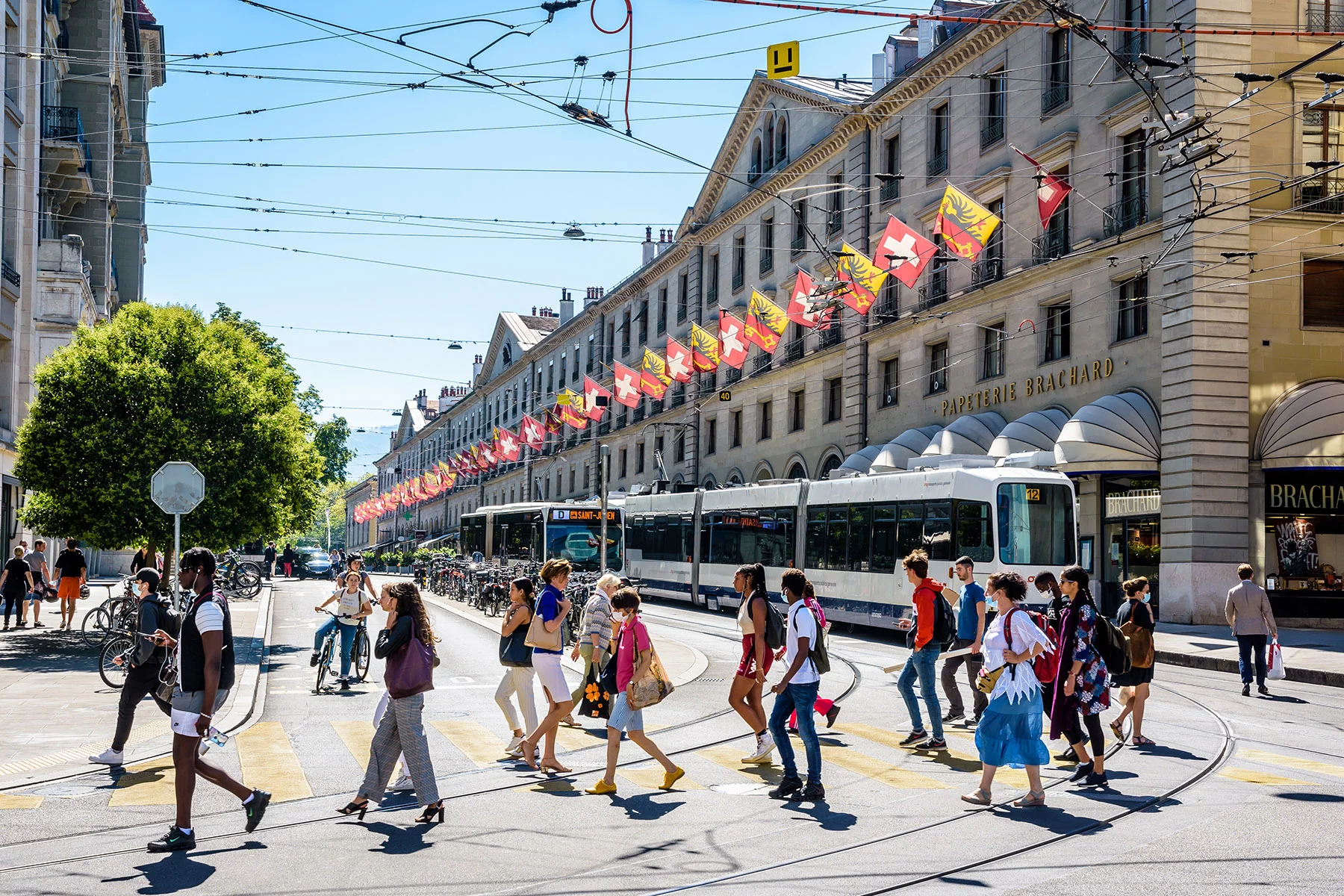
The typical Swiss character has also perfected a somewhat negative mental attitude so that it can process things more positively. To sum it up, Müller’s Law, the Swiss version of Murphy’s Law, states that “whatever can go wrong, will go wrong – but we will be more than prepared for it”.
The culture and values of people in Switzerland
To help you better integrate into the local culture in Switzerland, it’s important to understand the things that matter most to Swiss people. With this in mind, here are some key things to be aware of.
Culture and social etiquette in Switzerland
Let’s start with the most important. The Swiss appreciate honesty and tolerance. In fact, they are extremely proud of their neutrality and promotion of worldwide peace. However, that doesn’t mean that they don’t care about how other nations perceive them. On the contrary, they are very image-conscious and firmly believe that they are subject to constant inspection and criticism by the rest of the world.

This perhaps explains why the Swiss set such high standards for themselves in almost every aspect of life. In social situations, for instance, they place a lot of importance on good manners and polite behavior. As a result, most interactions between Swiss people remain formal. This manifests itself in handshaking which goes to absurd lengths; even schoolchildren shake hands when meeting in the street. It is also important to maintaining eye contact when doing so.
Another example is the custom of giving flowers or a small gift, such as chocolate, books, wine, or candy, when visiting someone in their home. And because appearance is paramount in Switzerland, you should make sure you turn up clean and neatly dressed, too.
This sense of maintaining high standards can also be seen in the quality of products the country produces; from its iconic Rolex timepieces to its luxurious Lindt chocolates. In fact, the Swiss have a healthy belief that whatever originates in their own country is the best, including the people. Therefore, if the supermarket offers Italian strawberries at half-price, Swiss people will generally opt for home-grown ones in the firm belief that theirs are vastly superior.
Work and business etiquette in Switzerland
Other national traits to consider in Switzerland are a strong work ethic alongside punctuality and formality. Again, being only a few minutes late for a meeting is especially rude and inconsiderate. As for business meetings, men typically wear suits and ties, while women opt for suits or dresses. Swiss people tend to place a high priority on their privacy and value it greatly. Therefore, questions about someone’s private income or wealth are considered to be very rude.

The importance of privacy also translates to body language. For instance, it is seen as rude to stand too close to someone during a conversation. Instead, you should aim to stand at least an arm’s length apart. For friends and families, however, it is normal for them to touch when they are speaking. In order to make a good impression, you should also maintain a good posture.
Finally, a few other bits and pieces to keep in mind. Academic and professional titles, such as ‘Dr’ are used frequently, so if you know their title, remember to address them in this way. If you don’t, however, then use ‘Mr’, ‘Mrs’, or ‘Miss’ if you are speaking English. And last, but not least, it’s rude to talk loudly when using mobile phones in restaurants, on public transportation, or when queuing.
National dress, style, and fashion in Switzerland
Believe it or not, not all Swiss people parade around the streets wearing a dirndl (the traditional female dress) or lederhosen (for men). These vibrant yet practical traditional outfits were once worn by many men and women in the Alpine regions. However, nowadays, Swiss people generally wear modern western-style clothing and the national dress is limited to tourism.
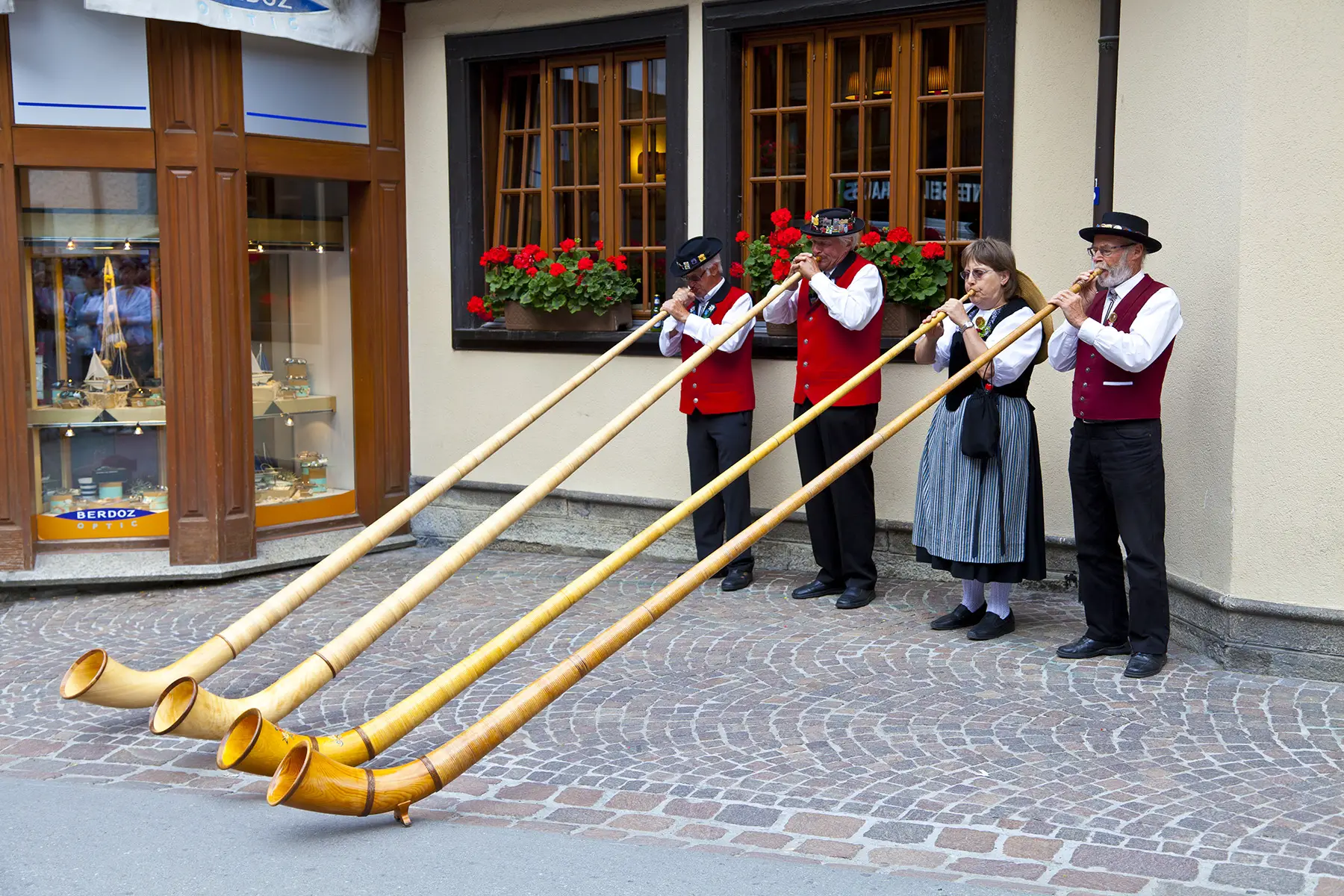
That said, when the time comes to celebrate one of the many traditional Swiss festivals, Swiss people love nothing more than to pull out the traditional dress of Switzerland which was worn by their ancestors, and parade through the streets. Notably, there are also many variations depending on which canton you find yourself in. For instance, every canton has its own themes and motifs – such as animals, flowers, mountains, and people – that feature in its national costumes. The color of the outfits, as well as the type of jewelry that is worn with them, also varies across the regions.
When it comes to everyday dress in Switzerland nowadays, it’s safe to say that the famous Swiss neutrality extends to this and people generally wear whatever makes them feel comfortable; while avoiding being overly-outlandish. That said, there are still plenty of ridiculously outdated notions that you might stumble upon on the internet. One of these is that you should avoid wearing jeans and tennis shoes and that you should stick to dark clothing. But this simply isn’t true.
What people in Switzerland like to do
From its stunning Alpine mountains to its crystal-clear lakes and rivers, Switzerland boasts some of the most beautiful and unspoiled scenery in the world. Therefore, it’s only natural that Swiss people like to keep it clean and litter-free. In fact, they have a zero-tolerance attitude when it comes to throwing garbage in the streets or in natural surroundings. As a result, you will find garbage cans in every corner – and it would be wise to use them.

They also try to use public transport as much as possible and encourage their kids to either walk or bike to school to keep the air cleaner. Their environmental friendliness comes from their love of nature. And it’s easy to see why they care so much about protecting it when they relish so many outdoor activities, such as hiking, skiing, and mountain biking.
People in Switzerland also have a deep appreciation of the arts, which can be seen in the country’s many museums and cultural attractions. Not only do they enjoy it, but they also take pride in it. Aside from visual arts, the country is known for its great story-tellers like Herman Hesse, as well as its rich traditional music. It also boasts great architecture and design, which goes to show just how much art is apparent in everyday Swiss life.
Where people in Switzerland work
With its incredible quality of life, high wages, and forgiving taxes, it’s no wonder that Switzerland is a popular destination for fresh graduates and veterans across a wide spectrum of fields and industries. Despite this, Switzerland’s reputation as a banker’s paradise isn’t wholly unfounded.

That said, the entire range of the country’s major industries might just surprise you. Here are some of the leading sectors:
- finance and related services, including banking, insurance, audit, financial technology, and consultancy
- information technology
- machinery, mechanical, and electrical engineering, and metals
- pharmaceuticals and chemicals
- renewable energy; particularly hydropower
- biotechnology and life sciences
- aerospace
- manufacturing parts for cars and other vehicles
- tourism
As a whole, Switzerland is a coveted business hub. As such, numerous multinationals, including Google, IBM, Microsoft, and PwC, have offices located in the country. The following groups and companies also have headquarters there:
- Adecco Group (employment agency)
- Alliance Boots (pharmaceuticals and retail)
- Credit Suisse (financial services)
- Glencore International (commodities trading)
- Migros (retail)
- Nestlé (food and drink, consumer goods)
- Novartis (pharmaceuticals)
- Roche Group (pharmaceuticals)
- Swiss Re (reinsurance)
- Swiss (airline)
- Xstrata (mining and minerals)
- Zurich Insurance Group (insurance)
Working hours and holiday
You might wonder how all this thriving business and industry reflects on the everyday working lives of Swiss people. Well, the answer is, not that dissimilar from other European countries. Under Swiss employment law, normal working hours should be a maximum of 45 hours per week for office staff and retail workers, and 50 for other workers.

Holiday allowances, meanwhile, are similar to countries such as the United Kingdom. All employees over the age of 20 are entitled to at least four weeks’ holiday per year, plus national holidays, including Swiss National Day on August 1, and regional holidays observed by individual cantons. Workers under the age of 20, meanwhile, get five weeks’ holiday per year. Many employers also increase this amount for long-term workers.
In terms of income tax, the system is progressive, so you pay more as you earn more. It consists of three elements: federal, municipal, and cantonal. Notably, tax rates can vary considerably between cantons, ranging from around 41.3% in Zurich to 23.1% in Zug.
Where people in Switzerland live
As mentioned, Switzerland has a population of more than eight million living across its 26 cantons. The country’s top five population hubs are Zurich, Geneva, Basel, Lausanne, and Bern.

Apartments are the most common type of accommodation found in Switzerland. This is not only the case in the larger cities such as Zurich and Geneva but also in the smaller towns. This is because houses are disparately more expensive and found well outside urban areas, making them less suitable for expats. Most apartment rentals in Switzerland will also come unfurnished, which is something to be aware of when looking for a place to live in the country.
Those who prefer something more short-term might also opt for a serviced apartment or long-term holiday rental. These are great options to tide you over while you look for your new Swiss home. However, be aware that you will need to stay at the same address throughout the registration process, which can take several weeks.
Famous people in Switzerland
Want to impress your new Swiss friends by rounding off some quick facts about the country’s most famous sons and daughters? Well, here are a few household names to drop into the conversation:
- Roger Federer – tennis player. Not just any tennis player, though, but arguably, the G.O.A.T (Greatest Of All Time)
- Carl Jung – the father of analytical society. Also the G.O.A.T (depending on your leanings)
- H.R. Giger – more commonly known as the guy that invented the alien from the movie, Alien

- Jean-Jacques Rousseau – one of the preeminent philosophers, writers, and composers of the 18th-century
- DJ BoBo – what do you mean you’ve never heard of DJ BoBo?! This Swiss singer-songwriter, rapper, dancer, and music producer has sold a whopping 14 million records worldwide and released 12 studio albums
